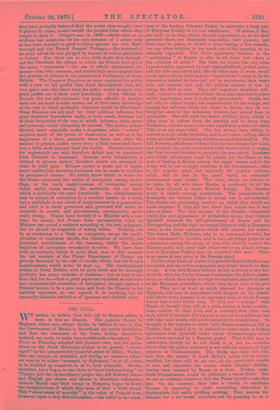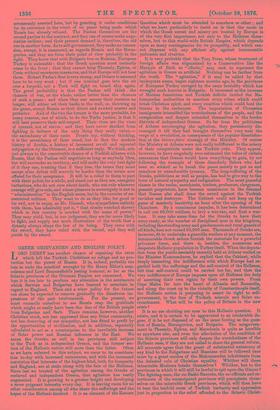THE LULL.
WE incline to believe that this lull Eastern affairs is more or less an illusion. The popular theory in • England, where men always dislike to believe in war, is that the Government of Russia is disinclined for active hostilities, and that the statesmen of the Porte, finding themselves isolated, are ready to make very considerable concessions. The Times on Thursday adopted this pleasant view, and the specu- lators on the Stock Exchange profess to be greatly " encou- raged" by the comparatively peaceful aspect of affairs. Turkey, they say, accepts an armistice, and during an armistice affairs are sore to be either "arranged by diplomacy," or at all events to be huddled up somehow, so as to look peaceable. Stocks, therefore, have begun to rise, there is "more business doing" on 'Change, and the extraordinary people who tell Railway shares and English gas shares and shares in knerican enterprises because Russia may land troops in Bulgaria, begin to doubt the farsightedness of which they were at first a little proud. This " sweet sense of security " in the value of Consols rests, however, upon a very thin foundation,—the belief in the readi- ness of the leading Ottoman Pashas to surrender a large part of European Turkey to its own inhabitants. Of course, if they are ready to do that, which, though improbable, is, as we shall presently show, not absolutely impossible, cadit picestio, and there may be peace, or rather a truce lasting a few months, but any other solution is too much out of the question to be seriously regarded. The Times apparently believes in the " moderation " of Russia or else in its fears, but where is the evidence of either ? The Czar, no doubt, like any other hypochondriac oppressed by vast responsibilities, prefers peace, and the able men about him, like all other men of sense, would much rather obtain their ends by " moral force,"—that is, by the impression created by force not yet in movement, than waste lives and treasure and risk the endless chances of war by taking the field at once. They will negotiate, therefore, will- ingly; and as to the element of time, there is no time lost bya few weeks' negotiation, even if it should prove sterile. Russia has not only to collect troops, but commissariat for her troops, and though her railways bring her closer to Servia, they do not bring her close to the Armenian frontier, her second base of operations. She will need her desert artillery there, which it takes time to collect from the arsenals and to bring from Turkestan, and she must have some supplies on a scale for which Tiflis is as yet unprovided. She has always been willing to consent to a six weeks' armistice, and is, of course, willing also to waste six weeks in discussing whether an armistice shall be. The lull, however, affords no evidence that she has changed her rabid, and certainly the great force behind the throne which is urging the Czar forward remains in precisely the same mood. Immense and visible advantages must be gained for the Slays, or the state of feeling in Russia among the upper classes and in the Army will be one of angry criticism of the Government,—that is, the popular mind, and especially the popular military mind, will be just in the mood which an autocratic Government most dreads. This view, which we believe to be taken by all who know Russia, is confirmed by all the few facts allowed to reach Western Europe. The Russian Army is clearly moving southwards. The preparations of Roumania are ruinous follies if actual war is not intended. The Greeks are purchasing matdriel on which they would not waste sixpence if they did not know that actual War is very near at hand. The only account of the Russian ultimatum which has any appearance of probability shows that General Ignatieff demands the self-government of Bosnia and the Herzegovina, and the right to occupy Bulgaria with a European army, as the least concession which will content his master. The Grand Duke Nicholas, who is to command-in-chief, has been summoned to Livadia, and in fact, all things point to an expectation among the group of men who directly control the Russian policy and army that either war or an armed occupa- tion of European Turkey may be expected this year. There is no peace at any price in the Russian mind.
On the other hand, of course it is possible that the Pashas may surrender, and one or two arguments may weigh heavily in their minds. A war with Russia without an ally is always a very for- midable affair for Turks, because it endangers the Asiatic posses- sions, in which they hope to reign for centuries, almost as much as the European possessions, which they know they must give up. They are at least as much alarmed for Armenia as Bulgaria, and may be acquainted with dangers on the Asiatic side, where every peasant is an oppressed man, of which Europe has at best a very feeble idea. If they can " arrange " with Russia by herself, they will, at a price, obtain at least security, some comfort in their lives, and a certainty that their own mob, which if irritated will not pass a vote of no confidence, but will take their heads, will not be permitted to attack them. So strongly is the impulse to settle with Russia sometimes felt in Turkey, that Abdul Aziz is believed to have made a definite agreement with Ignatieff, under which Constantinople would have been occupied by a Russian guard. That belief may be unfounded, though we do not think it is, but its existence shows that the policy indicated is not 'without support in high quarters in Constantinople. The Turks may take this line, and then the beauty of Lord Derby's policy will be clearly manifest, for there will be no war, all the conceivable results of wan, and especially the results which England dislikes, having been attained by Russia at a blow. Turkey, under these circumstances, would be politically a vassal State. But we see no evidence whatever that the Turks intend to take this line. On the contrary, their idea is clearly to conciliate Europe by appearing to yield everything demanded by diplomatists, but really yielding nothing. They answer the demand for a six weeks' armistice, not by granting it; as is
protector. And of the two the former is the more probable, for immigrants intensified the wretchedness of the people, and the
many reasons, one of which, to do the Turks justice, is that it exasperation and despair extended themselves to the border will best preserve their self-respect. Their vices are the vices districts of independent Greece. So far from the politicians of tyrants, not of slaves ; and they have never skulked from of Athens encouraging the agitation, they persistently dis- fighting in defence of the only thing they really value,— couraged it till they had brought themselves very near the the ascendancy of their caste. People say, without thinking, verge of a revolution, in consequence of the popular dissatisfac- it is the ascendancy of their creed, but to that the modern tion at the laissez-faire strategy of the Ministry. Of course history of Arabia, a history of incessant revolt and repeated the Ministry at Athens were not really indifferent to the misery subjugation by the Ottoman, is a sufficient reply. We think, sub- of their compatriots under the Turkish yoke. They appear, ject always to the conceivable chance of a Turkish alliance with however, to have singularly over-estimated the value of certain Russia, that the Pashas will negotiate as long as anybody likes, assurances that Greece would have everything to gain, by not but will surrender no territory, and will make the very best fight following the example of those disorderly Sclays who had of it they can, trusting that if they lose, the terms they must been so wicked as to break the peace merely to put an end accept after defeat will scarcely be harder than the terms now somehow to unendurable tyranny. The long-suffering of the offered for their acceptance. It will be a relief to them to part Greeks, politicians as well as people, has had to give way to the with their polish for a while, and stand out as they are, energetic force of natural sympathy and indignation. The most peaceful barbarians, who do not care about death, who can rule wherever classes in the realm, merchants, traders, professors, clergymen, courage will give rule, and whose pleasure in sovereignty is not in peasant proprietors, have become unanimous in the demand
administration " in the English sense, but in the exercise of un- that Greece also shall draw the sword against the Turkish restricted volition. They want to do as they like, for good or ravisher and destroyer. The Cabinet could not keep up the for evil, not to enjoy, as Mr. Disraeli, who sympathises entirely game of masterly inactivity an hour after the opening of the with them, has admirably put it, " that closely watched slavery Chambers. By a unanimous impulse, it has been determined which in this country is mocked with the name of power." to call out 60,000 soldiers, to levy a war-tax, and float a war- They may yield, but, in our judgment, they are far more likely loan. It may take some time for the Greeks to have their to fight, and supply one more illustration of the truth that a army ready, as the number of disciplined men in the kingdom, dynasty always obeys the law of its being. They came with including the standing army and gendarmerie and rural guards of the sword, they have ruled with the sword, and they will all kinds, does not exceed 30,000 men. Thousands of Greeks are, perish by the sword. however, fit to undertake a guerrilla warfare at any moment, the



































 Previous page
Previous page